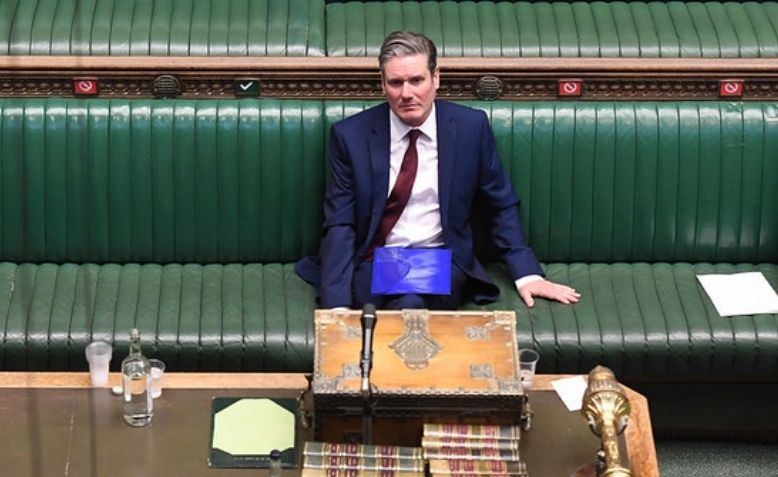 Keir Starmer at PMQs. Photo: Flickr - Jessica Taylor / UK Parliament / cropped from original / licensed under CC 2.0, links at the bottom of article
Keir Starmer at PMQs. Photo: Flickr - Jessica Taylor / UK Parliament / cropped from original / licensed under CC 2.0, links at the bottom of article
By opposing an increase in corporation tax, Kier Starmer’s failure to offer an alternative to the Tories has become farcical, writes Terina Hine
We have truly entered an Alice in Wonderland world where the Conservative party’s low-tax Chancellor is about to raise taxes, only to be opposed by Keir Starmer’s Labour party.
‘Now is not the time for tax rises’ says Keir Starmer and Labour’s shadow Chancellor, Anneliese Dodds agrees. ‘Oh yes it is’, says the smooth-talking Tory Chancellor Rishi Sunak.
Starmer has decided that any tax rises in tomorrow’s budget will be opposed. This stance may have been understandable when directed at the government’s proposals for council tax hikes, which are set to place huge demands on already struggling households, but definitely not when it comes to corporation tax – the tax on profits made by limited companies – and the tax expected to be targeted in the budget.
So, on Wednesday we could witness the bizarre spectacle of Labour MPs siding with any right-wing Tory rebels brave enough to oppose Sunak’s budget. Unsurprisingly, some Labour MPs are feeling uneasy, including some members of the shadow cabinet.
So how did we get here? After all, Starmer pledged in his leadership campaign to reverse Tory cuts to corporation tax; the 2019 Labour manifesto promised the same.
The UK already has the lowest rates of corporation tax in the G7. Treasury officials are reportedly looking at raising the tax from its meagre 19% level to (possibly) 25%.
Assuming the rest of the G7 countries retain their current levels of taxation that would still place us almost at the bottom of the table, with only Italy one percentage point lower at 24%. (France, at the top of the table, has a corporate tax rate of 33%.)
In the US, the Biden government, hardly on the hard-left, is examining proposals to raise corporation tax to 28%. The tax currently stands at 21% having been dramatically reduced from 35% by the Trump administration in 2017.
Even William Hague, in an article in today’s Daily Telegraph, admitted that having argued for lower taxes most of his life, he now believes that some business (and personal) taxes ought to go up to help deal with the economic crisis.
It appears that Keir Starmer has positioned himself considerably to the right of mainstream conservative thinking.
Socialist Labour MP Richard Burgon warns that Labour risks being ‘outflanked’ by the Tories with its stance on taxation and its lack of an alternative economic plan. Labour must be bolder, he said, ‘must step up its opposition to this government,’ and show people that ‘we have their backs and we have a better way forward for them.’ The budget should be an opportunity for Labour to do just that.
Starmer is unlikely to be very concerned about criticism from the left of the party – having a public spat with the likes of Burgon, Trickett and Lavery may be just another phase in the leadership’s crusade against Corbyn’s allies. But this time it may be riskier than he thinks; it is not just the left that Starmer is upsetting. There have been grumblings and anonymous briefings even from the shadow cabinet.
And Starmer’s leadership is polling at an all-time low. Perhaps this is the reason for a slight shift in emphasis coming from Anneliese Dodds as she said that the party would support a ‘gradual increase’ in corporate tax after all, just not right now. A muddle of a correction that will not fool anyone.
The pandemic has laid bare the extreme levels of inequality in our society, caused in part by years of austerity. Labour should be pushing for measures to boost household income, to tackle child poverty and to end the freeze on public sector pay. They should demand the £20 uplift in Universal Credit be made permanent, and for proper long-term investment in the NHS and social care. And they should be setting out a vision for post-Covid Britain.
But as the Tories promote their ‘levelling up’ agenda Labour offers nothing.
In its attempt to become the party of business Labour is turning its back on those it should be defending. As Ian Lavery so succinctly said, this latest move by the Labour leadership will leave people wondering what Labour is for.
Before you go
Counterfire is growing faster than ever before
We need to raise £20,000 as we are having to expand operations. We are moving to a bigger, better central office, upping our print run and distribution, buying a new printer, new computers and employing more staff.

